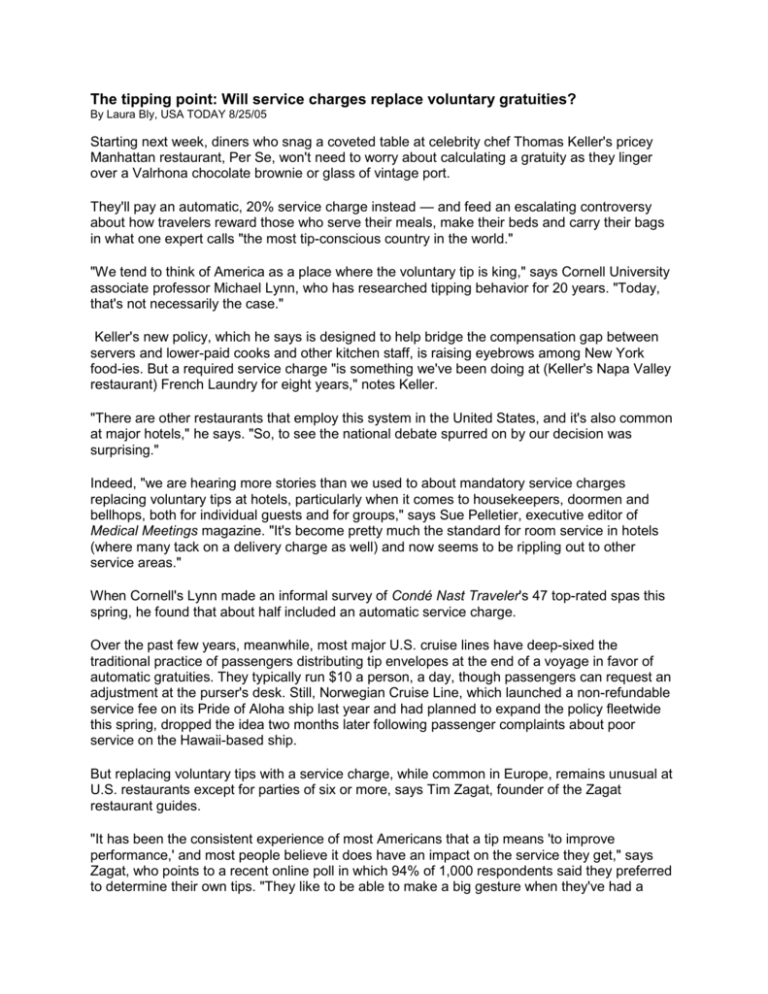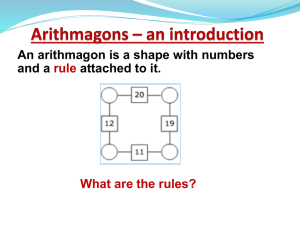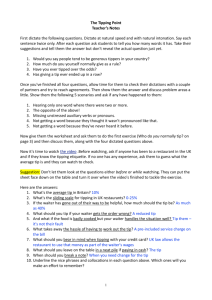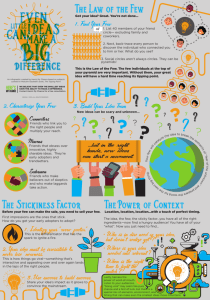The tipping point: Will service charges replace voluntary
advertisement

The tipping point: Will service charges replace voluntary gratuities? By Laura Bly, USA TODAY 8/25/05 Starting next week, diners who snag a coveted table at celebrity chef Thomas Keller's pricey Manhattan restaurant, Per Se, won't need to worry about calculating a gratuity as they linger over a Valrhona chocolate brownie or glass of vintage port. They'll pay an automatic, 20% service charge instead — and feed an escalating controversy about how travelers reward those who serve their meals, make their beds and carry their bags in what one expert calls "the most tip-conscious country in the world." "We tend to think of America as a place where the voluntary tip is king," says Cornell University associate professor Michael Lynn, who has researched tipping behavior for 20 years. "Today, that's not necessarily the case." Keller's new policy, which he says is designed to help bridge the compensation gap between servers and lower-paid cooks and other kitchen staff, is raising eyebrows among New York food-ies. But a required service charge "is something we've been doing at (Keller's Napa Valley restaurant) French Laundry for eight years," notes Keller. "There are other restaurants that employ this system in the United States, and it's also common at major hotels," he says. "So, to see the national debate spurred on by our decision was surprising." Indeed, "we are hearing more stories than we used to about mandatory service charges replacing voluntary tips at hotels, particularly when it comes to housekeepers, doormen and bellhops, both for individual guests and for groups," says Sue Pelletier, executive editor of Medical Meetings magazine. "It's become pretty much the standard for room service in hotels (where many tack on a delivery charge as well) and now seems to be rippling out to other service areas." When Cornell's Lynn made an informal survey of Condé Nast Traveler's 47 top-rated spas this spring, he found that about half included an automatic service charge. Over the past few years, meanwhile, most major U.S. cruise lines have deep-sixed the traditional practice of passengers distributing tip envelopes at the end of a voyage in favor of automatic gratuities. They typically run $10 a person, a day, though passengers can request an adjustment at the purser's desk. Still, Norwegian Cruise Line, which launched a non-refundable service fee on its Pride of Aloha ship last year and had planned to expand the policy fleetwide this spring, dropped the idea two months later following passenger complaints about poor service on the Hawaii-based ship. But replacing voluntary tips with a service charge, while common in Europe, remains unusual at U.S. restaurants except for parties of six or more, says Tim Zagat, founder of the Zagat restaurant guides. "It has been the consistent experience of most Americans that a tip means 'to improve performance,' and most people believe it does have an impact on the service they get," says Zagat, who points to a recent online poll in which 94% of 1,000 respondents said they preferred to determine their own tips. "They like to be able to make a big gesture when they've had a great meal," he adds. And although "it's very rare to stiff the waiter, people do go down to 10% or 15% when they're miffed." Some frequent travelers welcome the concept of service charges, at least in a few settings. "I would love it at hotels," says Stephanie Dickey, a Richmond, Texas-based sales executive. "I hate always having to have plenty of ones and fives to tip the valet, the bellman at the front, the bellman who brings my bags to my room, housekeeping, housekeeping for bringing something to my room, and so on." On the other hand, "I've always felt that dining service is subpar in countries where there is a flat service fee." Indeed, Linda Hirneise, a partner at JD Power and Associates, says customer feedback shows "satisfaction is always lower when guests are faced with added-on gratuities. People want resort fees and Internet access to be included in the room bill, but they're absolutely resentful" about not having a choice on when and whom to tip, she says. "It all comes down to full disclosure," adds Robert Mandelbaum, an analyst at PKF Consulting. "People don't want to be tipping the maid every night, only to find when they check out that they've already been charged for it. And historically, hotels have not done a very good job in that area." Regis Philbin would agree. After tipping a bellman at Miami's Boca Raton Resort & Club this spring, the employee informed the TV talk-show host that his services were already covered by a $9 resort fee posted to Philbin's account. The charge was an unwelcome surprise, and he was too embarrassed to ask for his tip back, Philbin told viewers. (Boca Raton's daily resort fee, now $18, still includes bellman services and resort transportation — along with such additional extras as free Internet service, phone calls and use of the fitness center. According to a hotel spokesman, guests are informed of the fee at check-in.) Bill Mellor, a London-based sales manager who travels frequently to the USA, says the practice of adding automatic tips to restaurant bills is common in some parts of Florida: "South Beach, along with International Drive in Orlando, seem to have had this service-charge approach for some time now. But its application is patchy." "I am particularly irritated by those places that add the service charge and then leave the credit card slip open to add another gratuity," Mellor adds. "This is just taking foreign visitors for idiots. I have questioned this and heard a range of excuses from 'that's just what the credit card software does' to 'well, maybe (you) want to leave some additional appreciation.' " "We're in a tourist-oriented environment where a lot of people come from places where tipping isn't standard," says Tony Magaldi, whose News Café restaurant in Miami Beach has included a "suggested gratuity" of 15% on all bills for more than a decade. While about 5% of customers opt to pay less, "about 60% tip more," he adds. Others take a more circumspect approach. "We do not permit our cashiers to ask a guest if they wish to tip," says Peggy Wynne Borman of Preston Wynne Spas, which operates a day spa at the Hotel Los Gatos in Los Gatos, Calif. "To me, it's still presumptuous and to a less confident guest, it feels coercive. Many spagoers are intimidated at the very thought of being in a spa, and I've seen that seemingly innocent question result in loud complaints of exploitation. Even putting cash tip envelopes in view on the checkout counter makes me a little queasy." "Calling a compulsory service charge a gratuity is tempting fate when you are in the hospitality business," she adds. "You're saying to the customer, 'We deserve this, whether you agree or AROUND THE WORLD OF not.' " TIPPING Sources: Magellan's, Travelocity, Fodor's, USA TODAY researchAs in the USA, tipping overseas can be confusing and variable. Some advice on how much to hand over: Country Restaurants Porters Tipping is officially illegal, Argentina None but waiters expect a small tip Taxis None Australia 10%-12% Not Round up expected Canada 15% $1-$2 a bag 10%-15% China 3% in major cities $1-$2 total None Costa Rica None $1 a bag $1 for special services England 10% if no service $1 a bag charge 10%-15% France Up to 10% $1 a bag Round up Japan Tips are viewed as insulting None None Mexico 10%-15% if no service charge $1-$2 50 cents$1 New Zealand None None None South Africa 10% if no service 50 cents charge total 10% Thailand None None None And for those customers who don't, there is still recourse, says David Downing of Fodors.com. "You need to be vocal. ... If you ask upfront about charges and contest them with good reason, most places will back down." Tempting fate or not, such fees are "clearly touching a nerve," says Lalia Rach, associate dean of hospitality at New York University. "We've taken what is supposedly a simplistic concept and made it a movable standard, depending on what level of hotel you stay at, restaurant you eat at, and so on. We're confusing the consumer completely ... and I think it's only going to get more muddled." E-mail lbly@usatoday.com





